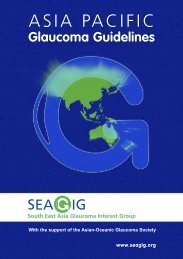NHMRC Glaucoma Guidelines - ANZGIG
NHMRC Glaucoma Guidelines - ANZGIG
NHMRC Glaucoma Guidelines - ANZGIG
Create successful ePaper yourself
Turn your PDF publications into a flip-book with our unique Google optimized e-Paper software.
<strong>NHMRC</strong> GUIDELINES FOR THE SCREENING, PROGNOSIS, DIAGNOSIS, MANAGEMENT AND PREVENTION OF GLAUCOMA<br />
Chapter 1 – Recommendations and Evidence statements<br />
Recommendation<br />
Evidence Statements<br />
Managing glaucoma successfully within specific<br />
comorbid conditions – Asthma<br />
Evidence indicates that using non-selective beta-blockers is<br />
generally contraindicated in patients with asthma, however<br />
cardio-selective beta-blockers may be used with caution.<br />
Managing glaucoma successfully within specific<br />
comorbid conditions – Chronic obstructive<br />
pulmonary disease<br />
Evidence indicates using beta-blockers with caution in patients<br />
with chronic obstructive pulmonary disease. Preference may<br />
be given to using cardio-selective beta-blockers as they are less<br />
likely to induce bronchospasm.<br />
Managing glaucoma successfully within specific<br />
comorbid conditions – Cardiovascular disease<br />
Evidence indicates using alpha 2<br />
-agonists with caution in<br />
patients with severe cardiovascular disease. A specialist<br />
cardiac opinion may be required for individual cases.<br />
Evidence indicates using beta-blockers with caution<br />
in patients with existing heart disease. Using these<br />
medications is contraindicated in patients with bradycardia<br />
(45–50 beats/minute), sick sinus syndrome, second or<br />
third degree atrioventricular block, severe hypotension<br />
or uncontrolled heart failure.<br />
Managing glaucoma successfully within specific<br />
comorbid conditions – Hepatic impairment<br />
Evidence indicates that systemic carbonic anhydrase<br />
inhibitors are contraindicated in patients with hepatic<br />
impairment, while topical carbonic anhydrase inhibitors<br />
may be used with caution.<br />
Managing glaucoma successfully within specific<br />
comorbid conditions – Renal impairment<br />
Evidence indicates that caution is required when considering<br />
systemic carbonic anhydrase inhibitors for patients with mild<br />
to moderate renal impairment, and these medications are<br />
contraindicated in patients with severe renal impairment.<br />
Medication-induced glaucoma<br />
Evidence indicates caution in the administration of<br />
corticosteroids delivered by any form (i.e. oral, intranasal or<br />
ocular) for patients with glaucoma or ocular hypertension.<br />
Evidence supports obtaining a comprehensive medication<br />
history from all patients with ocular symptoms suggestive of<br />
acute or chronic angle closure glaucoma, to rule out potential<br />
medication-induced glaucoma.<br />
Evidence<br />
Statement<br />
Grade<br />
B<br />
B<br />
B<br />
B<br />
B<br />
B<br />
B<br />
B<br />
22 National Health and Medical Research Council





